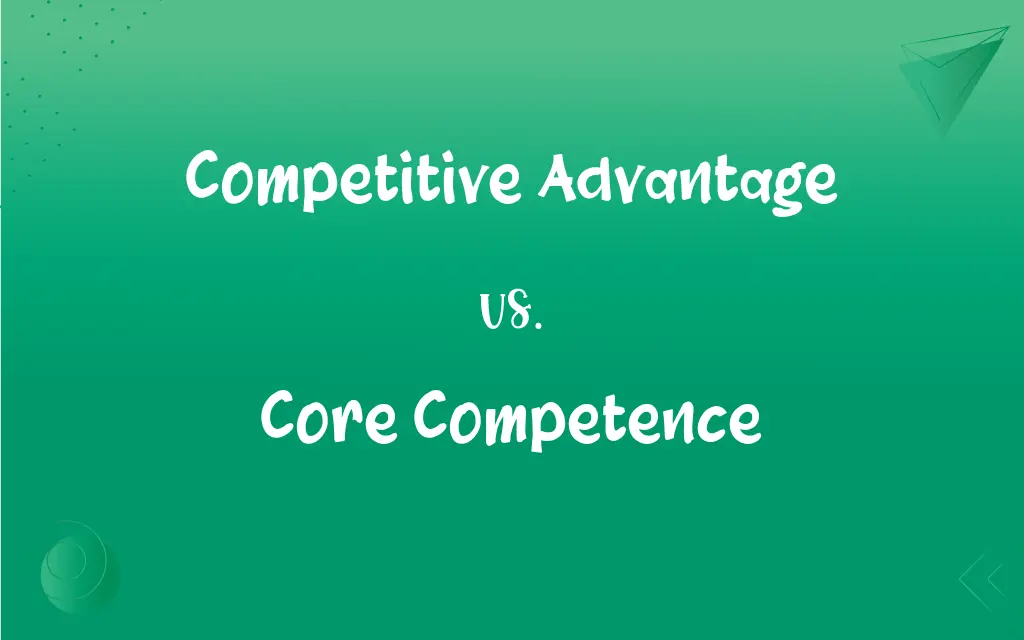Competitive Advantage vs. Core Competence: What's the Difference?
Edited by Harlon Moss || By Janet White || Published on November 12, 2023
Competitive Advantage is a unique edge a company has over rivals, while Core Competence is the fundamental strength or capability of a company.

Key Differences
Competitive Advantage refers to the distinctive attributes or capabilities that give an organization an edge over its competitors. It could be due to factors like brand reputation, technology, or superior customer service. On the other hand, Core Competence is an inherent strength or capability within a company, crucial for its survival and growth. It is the thing they do best and is central to their identity.
While Competitive Advantage can change over time based on external factors, Core Competence tends to be more enduring. A firm may possess multiple Competitive Advantages, but it might have only a few Core Competencies that define its essence and strategy.
Competitive Advantage often results from capitalizing on Core Competence. For instance, a company's Core Competence in innovation can lead to a Competitive Advantage in launching unique products frequently. In contrast, a company may have a Core Competence in logistics, giving it a Competitive Advantage in distribution and delivery.
A Competitive Advantage can be easily replicated or lost, especially if it’s not rooted in a solid Core Competence. On the other hand, Core Competence, being a deeply ingrained ability or strength, is not easily imitated by competitors. Thus, while firms always aim to retain and build their Competitive Advantage, it's equally important to nurture and develop their Core Competence.
Both Competitive Advantage and Core Competence are vital for a business. Competitive Advantage ensures that the company stands out in the marketplace, while Core Competence ensures that the company has a solid foundation on which to base its strategies and operations.
ADVERTISEMENT
Comparison Chart
Definition
Unique attributes giving an edge over rivals.
Fundamental strength central to a company's identity.
Duration
Can be temporary or fleeting.
More enduring and stable.
Replicability
Can be easily copied by competitors if not deeply rooted.
Difficult for competitors to imitate.
Result of
Often a manifestation of capitalizing on a Core Competence.
Inherent to the organization.
Number
Multiple advantages can exist concurrently.
Few central competencies defining a firm's essence.
ADVERTISEMENT
Competitive Advantage and Core Competence Definitions
Competitive Advantage
A distinct edge a company has over its competitors.
Apple's design aesthetic gives it a Competitive Advantage in the tech market.
Core Competence
Unique capabilities allowing a firm to perform at its best.
Innovation is Apple's Core Competence, leading to groundbreaking products.
Competitive Advantage
A unique position that allows a business to outperform its rivals.
Tesla's electric car technology gives it a Competitive Advantage in the auto industry.
Core Competence
Skills or expertise foundational to a company's operations and strategy.
Disney's storytelling ability is its Core Competence, captivating audiences worldwide.
Competitive Advantage
Superiority gained from factors beneficial to a company.
Amazon’s vast distribution network is a significant Competitive Advantage.
Core Competence
Inherent capabilities giving a firm its distinctive character.
McDonald's efficiency in fast-food operations is its Core Competence.
Competitive Advantage
Features or attributes making a company stand out in its sector.
Starbucks' brand loyalty is a clear Competitive Advantage.
Core Competence
A primary strength central to a company's performance and identity.
Honda's Core Competence lies in its engine manufacturing capabilities.
Competitive Advantage
Benefits making a company more profitable than its competitors.
Google's search algorithm provides it with a Competitive Advantage in the digital space.
Core Competence
Deep-rooted abilities that differentiate a company from the rest.
Samsung’s Core Competence in semiconductor technology has fueled its growth.
FAQs
How is Core Competence defined?
Core Competence is the fundamental strength or capability inherent to a company.
Is Core Competence easy for competitors to replicate?
No, Core Competence, being deeply ingrained, is hard for competitors to imitate.
What is Competitive Advantage?
Competitive Advantage is a unique edge a company has over its rivals.
Can a company have multiple Competitive Advantages?
Yes, a company can possess multiple Competitive Advantages concurrently.
Is Core Competence always evident to outsiders?
Not necessarily. Some Core Competencies may be subtle or internal to the company.
Is it essential for companies to have both Competitive Advantage and Core Competence?
While both are beneficial, Core Competence ensures a solid foundation, and Competitive Advantage ensures market differentiation.
Can Competitive Advantage be temporary?
Yes, Competitive Advantage can be fleeting if not based on strong Core Competence.
How can a company build its Competitive Advantage?
Companies can build Competitive Advantage by capitalizing on their Core Competence, innovating, and continuously improving.
Can Core Competence lead to Competitive Advantage?
Yes, Core Competence, when leveraged effectively, can lead to a distinct Competitive Advantage.
Can Core Competence change over time?
While Core Competence tends to be enduring, it can evolve with the company's growth and market changes.
How is Competitive Advantage beneficial to a company?
Competitive Advantage allows a company to stand out, attract customers, and achieve higher profits.
How often should firms reassess their Competitive Advantage?
Firms should regularly reassess to stay ahead of market changes and competitor moves.
Do all companies have a Core Competence?
Ideally, yes. Successful companies typically have a clear Core Competence guiding them.
Are Core Competencies always skills or abilities?
Mostly, but they can also be processes, knowledge bases, or even organizational cultures.
Can Competitive Advantage be purchased?
Some can, like technology or patents, but those rooted in Core Competence are harder to acquire.
Can companies lose their Competitive Advantage?
Yes, if they fail to adapt, innovate, or if competitors find ways to outperform them.
Should companies guard their Core Competence?
Absolutely. Protecting and nurturing Core Competence ensures sustained Competitive Advantage and success.
How can organizations identify their Core Competence?
Companies can identify Core Competence by analyzing what they do best and what's central to their identity and success.
Does every Competitive Advantage stem from a Core Competence?
Not always, but a Competitive Advantage rooted in Core Competence is more sustainable.
How do Core Competence and Competitive Advantage relate to company strategy?
Core Competence guides a company's foundational strategy, while Competitive Advantage shapes its market positioning.
About Author
Written by
Janet WhiteJanet White has been an esteemed writer and blogger for Difference Wiki. Holding a Master's degree in Science and Medical Journalism from the prestigious Boston University, she has consistently demonstrated her expertise and passion for her field. When she's not immersed in her work, Janet relishes her time exercising, delving into a good book, and cherishing moments with friends and family.
Edited by
Harlon MossHarlon is a seasoned quality moderator and accomplished content writer for Difference Wiki. An alumnus of the prestigious University of California, he earned his degree in Computer Science. Leveraging his academic background, Harlon brings a meticulous and informed perspective to his work, ensuring content accuracy and excellence.







































































